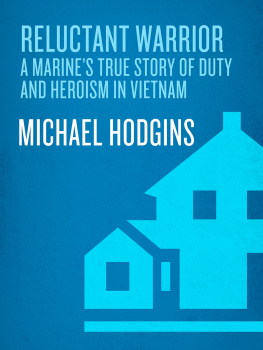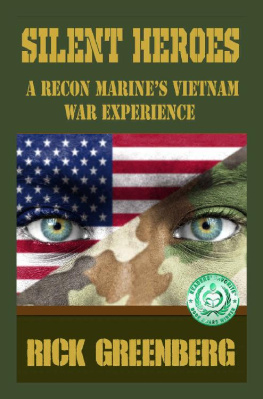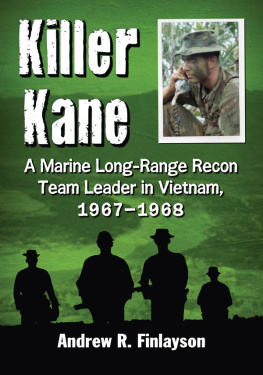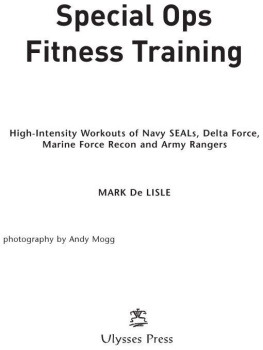With the first light of morning came the realization that there would be no emergency extraction because a thick fog covered the ground. Using natural cover, Jacques decided to move his men from their hiding spot in the banana grove in an attempt to find one of the trails they had discovered while patrolling. As they began to move, the NVA suddenly started firing. Jacquess men froze in place, only to discover that the enemy firing was not directed at them, but at the ARVN survivors. Knowing that the enemy still occupied the hilltop above them, Jacques changed the teams direction once again.
We had moved about three thousand meters away from our hiding place when I finally thought that it was safe to rest. I had just put the team in a tight little 360-degree defense when I heard the sounds of the nearby brush starting to break. I thought to myself, This is it. Ive done everything I can to get away, but the NVA wont give up. Theyre not going to take us alive.
FORCE RECON DIARY, 1970
Also by Bruce H. Norton
Force Recon Diary, 1969
Stingray
Encyclopedia of American War Heroes
With Maurice J. Jacques:
Sergeant Major, U.S. Marines
With Len Maffioli:
Grown Gray in War
With Donald N. Hamblen:
One Tough Marine
With Charles R. Jackson:
I Am Alive
FORCE RECON DIARY, 1970
Major Bruce H. Norton, USMC (Ret.)
Force Recon Diary, 1970
Quadrant Books
Published by arrangement with the author.
Copyright 1992 by Bruce H. Norton
All rights reserved. No part of this book may be reproduced, scanned, or transmitted in any form or by any means, electronic or mechanical (including photocopying, recording, or information storage and retrieval) without permission in writing from the publisher. For information please contact: or by writing us at the following address:
Endpapers Press
PMB 212
4653 Carmel Mountain Road, STE 308
San Diego, CA 92130-6650
eISBN: 978-1-937868-22-2
ISBN: 978-1-937868-34-5
Cover design by Toni-Tomislav Dalmatin
Library of Congress Control Number: 2013918195
Visit our website at www.endpaperspress.com
Quadrant Books are published by Endpapers Press,
a division of Author Coach, LLC
The Quadrant Books logo featuring a Q in the form of a compass is a trademark of Author Coach, LLC.
This book is dedicated to the memory of my father, George H. Norton.
Major Bruce H. Doc Norton, USMC (Ret.)
ACKNOWLEDGMENTS
My sincere thanks to Mr. Owen A. Lock, Editor in Chief, Del Rey Books, who has always been a straight shooter since the day I started writing.
My special thanks and most grateful appreciation to Lt. Col. Alex Lee, USMC; Lt. Col. C. C. Bucky Coffman, USMC; Col. J. J. Holly, USMC; Col. Chip Gregson, USMC; Lt. Col. Don Scanlon, USMC; Capt. Mike Hodgins, USMC; Sgt. Maj. M. Jacques, USMC; 1st Sgt. Charles O. Bud Fowler III, USMC; Mr. James C. Holzmann; BUC Michael A. Hobbs, USN; and to Mr. Rick Jenkins, Mr. Donald J. Mahkewa, Mr. David Draper, Mr. Mike The Big M Wills, Mr. Paul Keaveney, Mr. Wallace J. Nic Murray, and Mr. Guillermo Hi-ho Silva.
To the memory of these Force Reconnaissance Company Marines: Capt. Norman B. Centers, 1st Lt. Steve Corbett, Gy. Sgt. V. R. Thornburg, S. Sgt. D. E. Ayers, Sgt. R. C. Phleger, Sgt. D. J. Wickander, Cpl. Allen M. Hutchinson, Cpl. Adam Cantu, L. Cpl. Daniel Savage, and L. Cpl. W. M. Clark. They are not forgotten.
To the corporals and sergeants of the United States Marine Corps.
FOREWORD
COMBATLIKE THE fabled elephant described by the nine blind menis a thing that cannot easily be described. Facing the enemy from an altitude of thirty-five thousand feet is combat, as is the serving of endless hours of flight-deck duty aboard a carrier on Yankee Station. Cannoneers see one kind of war and tankers another. The infantry experience in combat ranges from life in line units shared with hundreds, or even thousands of others, to that experienced by those few in 3d Force Reconnaissance Company, who for the period 196970 were alone at the tip of the spear. Major Norton has done a magnificent job of creating for the reader a sense of the time, of the tone and tenor of those who did the intelligence-gathering missionsfifty to eighty miles from the nearest friendly unit. He has captured the intensity without phony bravado; he demonstrates the love of Corps and comrades that pervaded all that we did together, and throughout his narrative, he illustrates the psychological ties that bound the reconnaissance teams togetherthe total interlocking reliance that kept them alive. As you read, you may even taste the bitter copper in your saliva that comes to those who are in mortal danger of losing their lives to a determined enemy. That taste is the taste of fear, and anyoneI repeat, anyonewho, like Doc Norton, has faced up to that mortal danger, has known fear. There were no fearless Rambo characters in the real world of Force Recon, only young Americans trying hard to stay alive and do their job.
As a matter of interest to the reader, I might note that by 1969 it was clear to everyone, from Lieutenant General Herman Nickersonour generalto the lowest ranking Marine in I Corps, Republic of Vietnam, that the United States of America was not going to stay on in Vietnam to win. In the fall of 1969, the 3d Marine Division left Vietnam for Okinawa as part of the troop reduction, and more and more land became the property of the North Vietnamese. No one should misunderstand and see this narrative as being about a portion of the war fought against the Viet Cong insurgents! The units facing 3d Force Reconnaissance Company were elements of regular North Vietnamese Army forces, often deployed for no other purpose than to track down and kill the recon teams collecting intelligence information in their areas. In many instances, the enemy brought to bear sophisticated Soviet-made equipmentmobile radio direction finders, for exampleagainst the teams, backing that effort up with reconnaissance battalions tasked to find and kill the Marines. Knowing full well at a conscious level that there was no national will to win made every day harder, and as the commanding officer of 3d Force, it was my duty each day to send brave men like HM3 Norton and a host of others like him on missions far into the heart of enemy-controlled territory. All such missions were part of the larger intelligence-gathering plan, but being part of the big picture did not do a damn thing to make them any less dangerous. As the troop reductions went on, we found that we were the only Marine ground unit in northern I Corps. We were then truly the tip of General Nickersons spear.
The profession of soldiering is often referred to as the second oldest profession in the world. In concert with practitioners of that well-known older profession, all the competent warriors that I have known share a need to enunciate a certain depth of philosophical thought about that which we are required to do. A small unit like 3d Force Reconnaissance Company can laugh and sing and act the part of a fighting unit, but it cannot perform when under the stress of sustained hard use unless the members share a philosophical oneness that will carry them past any and all adversities. Stories from previous wars are woven into the fabric of being a Marine, but it is the unit philosophy that has been developed through hard work, that comes out when there is not enough food, not enough water, not enough air support, not enough clothing, not enough radio batteries, not enough explosives, and far too many complaints from staff officers in headquarters far from the scene of the fighting. In 3d Force Reconnaissance Company, our philosophy was solidly based on one guiding principle: as the tip of the spear, we were going to be asked to do great things, and you
Next page





